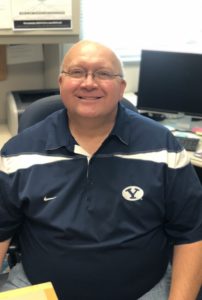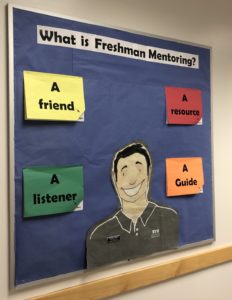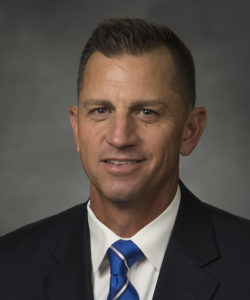BYU basketball freshman Zack Peterson spends eight or more hours on the third floor of the Student Athlete Building, but not for sports. He has required study hall hours.
All BYU first-year athletes, which includes freshmen, transfer students and returned missionaries, have required study hall hours in the Student Athlete Academic Center located on the third floor of the Student Athlete Building (SAB).
“It’s been a little bit challenging because, in high school, I didn’t read too much since we didn’t have very much reading, but now we have a lot,” Peterson said about the transition from high school to college. “It’s helped to have the (Student Athlete) Academic Center open and study hours. My coach likes us to have a 3.0 (GPA) or higher, so it helps our team keep up academically.”

The Student Athlete Academic Center provides athletes with academic resources such as academic advising, career counseling and testing, community service opportunities, a computer lab, group study sessions, laptop computers, leadership opportunities, adult and peer mentoring, sports psychology, study facilities and tutoring.
These resources are to help student athletes excel in their classes, considering they devote the same amount of time to BYU athletics that a part-time job would require.
“That’s one of the reasons why we put a large effort into providing resources,” said Jim Hamblin, an academic advisor to BYU football and men and women’s golf.
When discussing the caliber of BYU’s incoming freshman class that averaged around a 29 ACT score, Hamblin said, “I refuse to apologize for the resources that are made available to the student athletes. Any student on this campus can find a tutor or go to an academic advisor. Any student on campus can find the exact same stuff that we’re doing here, they just have to go find it.”

Academic advisement, counseling and career services, first-year mentoring, psychological services, enrollment services and more are available to all BYU students. Student athletes just have them in one place to keep them on track to graduate, despite their busy schedules.
“(The outside perspective) just doesn’t know what goes on in the day of an athlete,” BYU baseball head coach Mike Littlewood said. “Our guys wake up at 5:30 a.m. every single day, go to weights at 6 a.m. until 7:45 a.m., have class until 1 p.m., practice from 1 p.m. to 4 p.m., go to study hall right after that and before you know it, it’s 7 p.m. There’s just a lot going on in their lives that people don’t realize. They just see the games, and that’s the fun part.”

However, the key function of the Student Athlete Academic Center is to keep players eligible to play or compete. Both Littlewood and Hamblin explained that the NCAA follows the academic standards of the university, meaning that if players don’t make a cumulative 2.0 GPA, they are ineligible to play.
Coaches receive weekly grade reports in order to keep their athletes on track of maintaining eligibility.
“For me, if any grade is below a C, then I’ll cut their practice hours, and I’ll add study hall hours,” Littlewood said. “If it gets to a certain point where I think they can’t manage their class schedule, then I’ll cut all their practice time and still make them go to weight training in the morning at 6 a.m., but they don’t get to come out to practice, which is what they like to do. Instead, I make them go (to) 20 hours of study hall a week. So basically, they are living in the SAB.”
Despite their athletic endeavors, the Student Athlete Academic Center staff, coaches and student athletes recognize that athletes are students above everything else and are focused on their progression in the classrooms.
“I don’t think it’s going to be hard, but it will be challenging because I have so much baseball,” Peterson said when asked if it will be difficult meeting the NCAA and BYU required 2.0 GPA. “I’m a student athlete, so I have to get (my school work) done first because that comes first always.”




